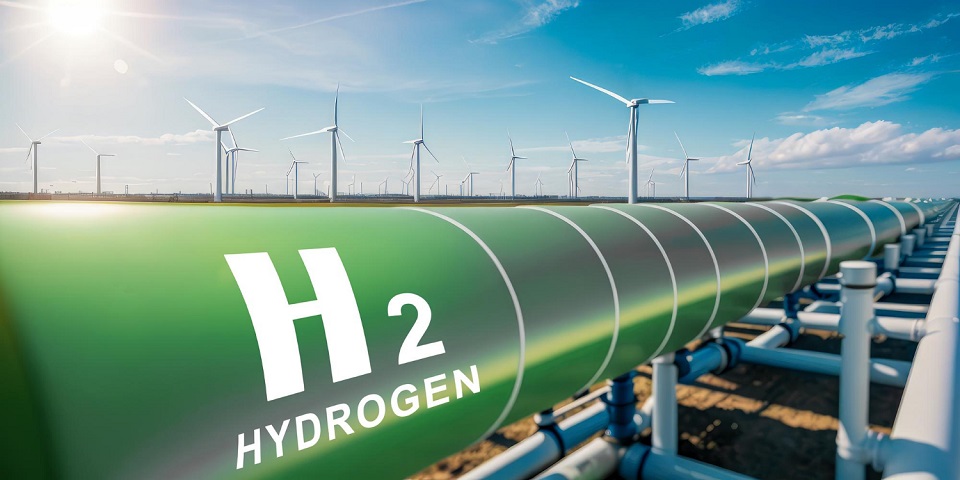Hydrogen: The Energy Carrier of the Future
The inherent erraticness of resources like wind and solar electricity must be overcome as we transition to a future dominated by renewable energy sources. Hydrogen energy storage has become one of the many viable options, and it is highly promising.
The most prevalent element in the universe, hydrogen, can serve as a source of energy. Essentially, it has the ability to store and transport energy, allowing extra energy created during periods of high renewable generation to be kept and utilized at a later time. The phrase “power-to-gas-to-power” refers to the process of transforming electricity into hydrogen and back again.
Power-to-Gas: Harnessing the Excess
The electrolysis method is used in power-to-gas technology to transform excess electricity from renewable energy sources into hydrogen. When water is electrolyzed, an electric current is used to separate it into hydrogen and oxygen.
Then, when needed, this hydrogen can be transformed into other types of energy like heat or electricity or stored for later use. Additionally, it can be blended with natural gas and used in already-existing gas infrastructure or used as a fuel for automobiles, allowing for the large-scale and long-term storage of energy.
Hydrogen Storage: Methods and Advancements
There are numerous ways to store hydrogen: chemically as a component of other molecules, physically as compressed hydrogen, or as a liquid in a cryogenic environment. However, because each of these approaches has particular drawbacks and difficulties, a great deal of research and development is being done to enhance hydrogen storage technology.
The development of solid-state storage, in which hydrogen is kept in metal hydrides or intricate chemical compounds, is one of the field’s most promising developments. This technology is best suited for mobility and portable applications since it has a higher energy density and improved safety.
Additionally, scientists are focusing on novel storage techniques such as storing hydrogen in nanoporous materials or in organic liquid carriers, both of which offer promising routes to effective, high-density hydrogen storage.
Hydrogen and Grid Stability
Maintaining grid stability can also be greatly aided by hydrogen energy storage. Power-to-gas technology can assist in balancing supply and demand, ease system load, and lessen the need to limit renewable energy sources by transforming extra electricity into hydrogen.
In order to guarantee a steady supply of electricity, stored hydrogen can be turned back into electricity at times of high demand or when the production of renewable energy is low. Because of its adaptability, hydrogen is a useful tool for integrating significant amounts of intermittent renewable energy into the power system.
Challenges and The Path Forward
Despite the advantages, there are still challenges to be overcome before hydrogen energy storage is widely used. The power-to-gas-to-power cycle currently has a low efficiency and is an expensive process. Furthermore, the necessary infrastructure for mass production, storage, and delivery of hydrogen is still in its infancy.
These difficulties can still be overcome. It is anticipated that cost reductions and increased efficiency will result from technological developments and economies of scale. Globally, policies encouraging the creation of hydrogen infrastructure and the incorporation of hydrogen into current energy systems are also picking up steam.
Additionally, the expansion of the hydrogen economy in sectors like transportation, heating, and industrial processes will expand the market for hydrogen, bringing down prices and promoting the construction of infrastructure.
Conclusion: The Bright Horizon of Hydrogen Energy Storage
With its exceptional capacity to store and transmit energy in a clean, adaptable, and efficient manner, hydrogen holds enormous potential for the future of energy storage. Hydrogen is an important component of a sustainable energy future due to its adaptability, compatibility with renewable energy sources, and potential for large-scale, long-duration storage.
Advancements in hydrogen energy storage will be crucial in solving the intermittency issue and providing a consistent, dependable energy supply as we continue to harness renewable energy sources. Although there may still be barriers in the way of widespread adoption of hydrogen energy storage, the potential advantages to our energy system and to the environment make the journey worthwhile. Hydrogen holds great potential for a future powered by renewable energy sources.


Leave feedback about this